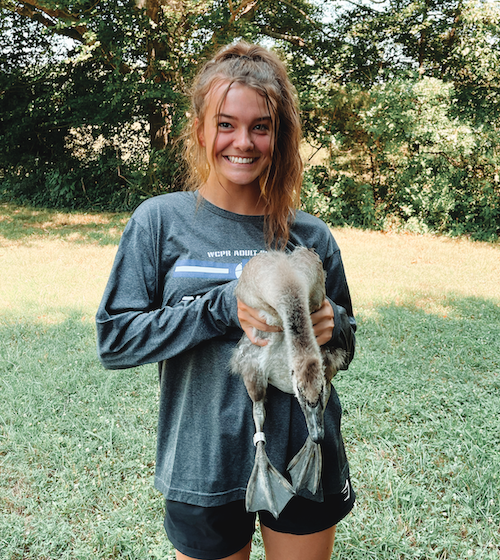Cookeville – Tennessee Tech University student Natalie Perkins of Smyrna spent this past summer in an unusual way: catching geese. The junior pre-med student majoring in biology with a double concentration in health science and microbiology was one of the students participating in the Creative Inquiry Summer Experience (CISE) this year.
The grant program provides paid internships to help students develop their research and creative inquiry skills. Upon acceptance, students work on a project with a faculty member during the summer and present their findings.
“I was initially interested in completing an undergraduate research project to gain experience in the realm of scientific inquiry in hopes of building a competitive medical school application,” Perkins said. “The CISE program sparked my interest because it is a summer experience, which is more conducive to my class schedule.”
Perkins decided on researching how stress may influence breeding locations and social behaviors of the Canada Goose in the Upper Cumberland. She worked with Richard Pirkle, senior instructor of biology at Tech, through the months of June, July and August. She also credits graduate student Kathryn Wilkins for helping to locate catching sites across Putnam County, which included small farm ponds and Cane Creek Park.
The research centered around comparing the stress levels of geese who are raising their young in a group compared to geese who are raising their young alone.
Perkins and Pirkle caught and drew blood samples from geese in various locations across the Upper Cumberland. Those samples were taken to a lab where they compared them. She found that males tended to have higher stress when they were helping to raise young in aggregations (groups of multiple pairs of reproductive geese) rather than in individual pairs. She also found that stress levels in the geese in the Upper Cumberland were much higher than what was expected, and that more research would be needed to understand the reason behind it.
“I thoroughly enjoyed working with Natalie,” Pirkle said. “She exhibited the type of dedication and interest that you expect from graduate students, not undergrads. The project went better than I ever expected. We were able to sample blood from a large number of geese, and Natalie and I were able to fully analyze the samples this summer. We have plans to go to a regional science meeting and present our results, and I intend to continue working with Natalie until we publish our findings in a peer-reviewed journal.”
Perkins thanks the Tennessee Wildlife Resource Agency for permitting the banding of the geese and Tech biology professor Daniel Combs, and the Summer 2022 Wildlife Techniques class at Tennessee Tech, for assistance in catching the geese.
“The CISE program granted me the opportunity to be exposed to scientific inquiry, project design and research,” Perkins said. “The program allowed me to work through the successes and failures that come with scientific research and to be immersed in a field of study that I had little prior experience with. The CISE program is an incredible opportunity for undergraduate students to get involved in the scientific community, and I would highly recommend it to any student interested in graduate studies.” For more information about the CISE program, visit https://www.tntech.edu/provost/ureca/cise.php









